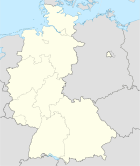Office Lügde
| coat of arms | Germany map | |
|---|---|---|
 Help on coat of arms |
Coordinates: 51 ° 57 ' N , 9 ° 15' E |
|
| Basic data (as of 1969) | ||
| Existing period: | 1951-1969 | |
| State : | North Rhine-Westphalia | |
| Administrative region : | Detmold | |
| Circle : | Höxter | |
| Residents: | 5873 (Dec. 31, 1967) | |
| Office structure: | 2 municipalities | |

The Lügde office was an office in the East Westphalian district of Höxter in North Rhine-Westphalia that had already been developed in the Prince Diocese of Paderborn and subsequently existed until 1969 . In the meantime, the Harzberg Office , also called the Lügde-Harzberg Office , existed in its area .
Organization and population
The office was divided into the two communities Harzberg and Lügde , of which the latter had town charter and was also the administrative seat.
In the last census before the dissolution of the office on May 6, 1961, the municipalities of the office had a resident population of 4,831 inhabitants. According to the extrapolation of the census results, this number rose to 5,873 inhabitants by the end of 1967. With an area of 32.25 km² there is an average population density of 182 inhabitants per square kilometer, which is well above the district average of 140 inhabitants per square kilometer. This made the Lügde office the smallest, but also the most densely populated office in the district. The following overview shows the two municipalities with their population and territorial status as of December 31, 1967:
| Surname | Residents | Area in km² |
|---|---|---|
| Harzberg | 108 | 1.05 |
| Lügde, city | 5,765 | 31.20 |
| Office Lügde | 5,873 | 32.25 |
geography
The office was a northern exclave of the Höxter district or, from 1816 to 1831, of the Brakel district , before both districts were merged on January 1, 1832. The exclave was recently limited by the Detmold district in the south and west and the Hameln-Pyrmont district in Lower Saxony in the north and east.
history
The Lügde office already existed before the 19th century as part of the Paderborn bishopric , which was annexed by Prussia in 1802/03. In the 17th century the prince-bishopric was in dispute with the county of Waldeck over the inheritance of the county of Pyrmont . It was not until 1668 that the Reich Chamber of Commerce decided on a settlement. The Lügde office fell to Paderborn, only the fishing and hunting rights remain with the Counts of Waldeck. The office was re - Catholicized mainly in the course of the Counter Reformation . At first there was only one judge at the head of the office; a Drost was installed under Prince-Bishop Clemens August . The first Drost was probably Franz Joseph von Mengersen zu Rheder in 1735 , who also became Drost of the Schwalenberg and Oldenburg-Stoppelberg offices . The von Mengersen resident in Rheder regarded the office as a "family inheritance". The office was part of the Oberwald district . From 1807 to 1813 the area belonged to the Kingdom of Westphalia . It then fell back to Prussia and became part of the Brakel district, founded in 1816, or part of the new Höxter district on January 1, 1832 after the Höxter and Brakel districts were merged.
In 1843, as part of the introduction of the rural community order for the province of Westphalia, the Harzberg office was set up, which only consisted of the Harzberg community and was co-administered by the city of Lügde. The city of Lügde remained vacant and did not belong to the Harzberg office, which in the following years was sometimes also called the Lügde-Harzberg office .
On April 1, 1922, the city of Lügde gave an inhabited area of about 0.2 km² with less than 100 inhabitants (1905: 77 inhabitants) to the municipality of Pyrmont in the province of Hanover . In 1934 the Harzberg office was abolished, making Harzberg a temporary municipality that was free of office. In 1951 the Lügde Office was finally formed from the city of Lügde and the Harzberg community .
On the basis of an area change agreement of March 24, 1969 and Section 7 of the “ Law for the Restructuring of the Detmold District ” of December 2, 1969, which also confirms the area change agreement with minor restrictions in Section 10 (7), the municipalities of the office with the eight signed The municipalities of Elbrinxen , Falkenhagen , Köterberg , Niese , Rischenau , Sabbenhausen , Wörderfeld and Hummersen of the Detmold district merged to form the new town of Lügde on January 1, 1970, which was incorporated into the Detmold district. The Lügde office was dissolved. The legal successor is the city of Lügde.
literature
- Friedrich Keinemann: The Paderborn Monastery at the end of the 18th century . 1996, ISBN 3-8196-0405-7 .
Web links
- Law on the reorganization of the Detmold district of December 2, 1969
Individual evidence
- ↑ cf. Keinemann 1996 Vol. 2: 128.
- ↑ Keinemann 1996 Vol. 2: 128ff
- ↑ Landgemeinde -ordnung for the Province of Westphalia from October 31, 1841 (PDF; 1.6 MB)
- ^ Official Journal of the Minden Government 1843: Formation of the Harzberg Office. Retrieved March 3, 2014 .
- ^ A b Wolfgang Leesch: Administration in Westphalia 1815–1945 . In: Publications of the Historical Commission for Westphalia . tape 38 . Aschendorff, Münster 1992, ISBN 3-402-06845-1 .

